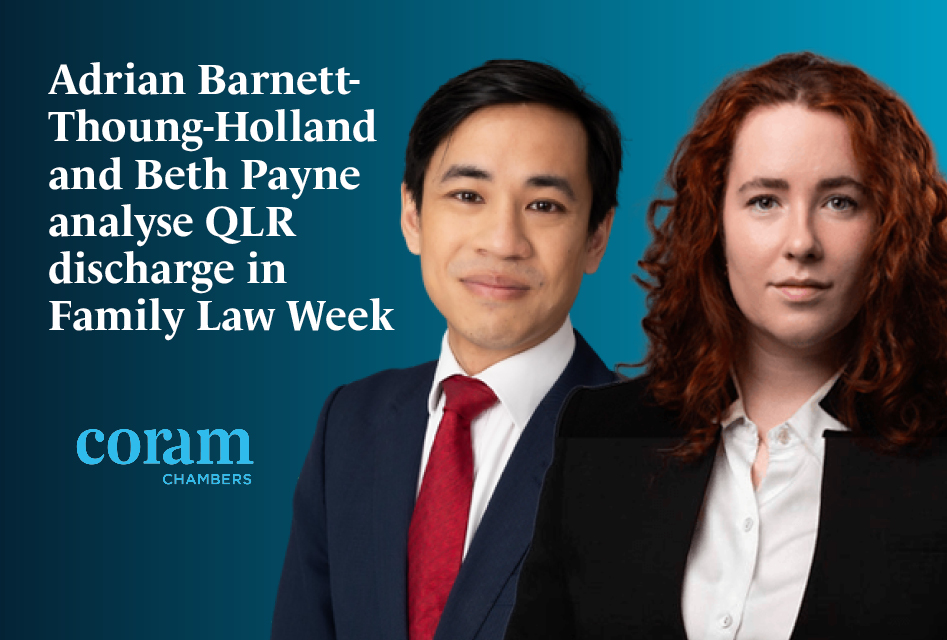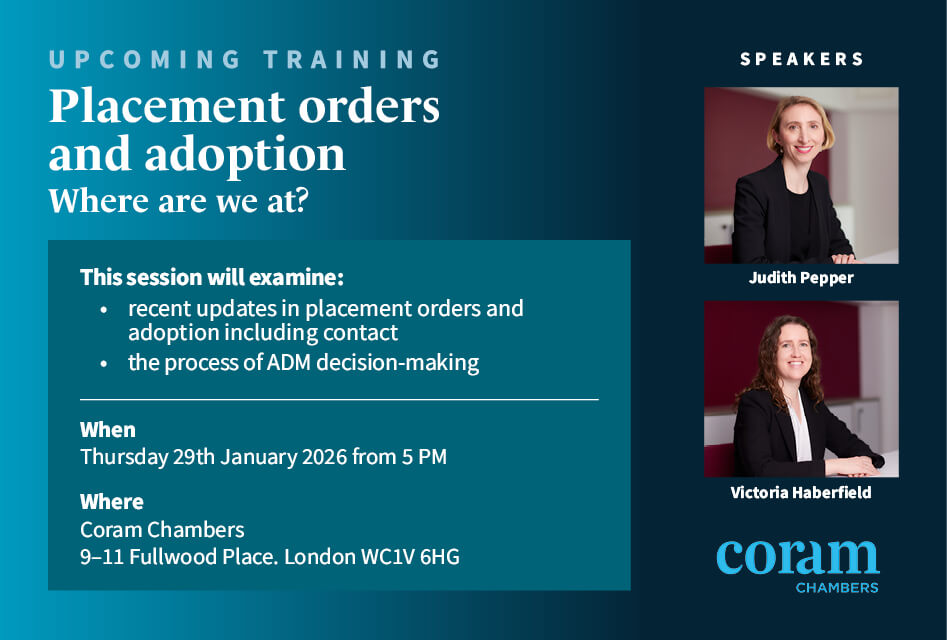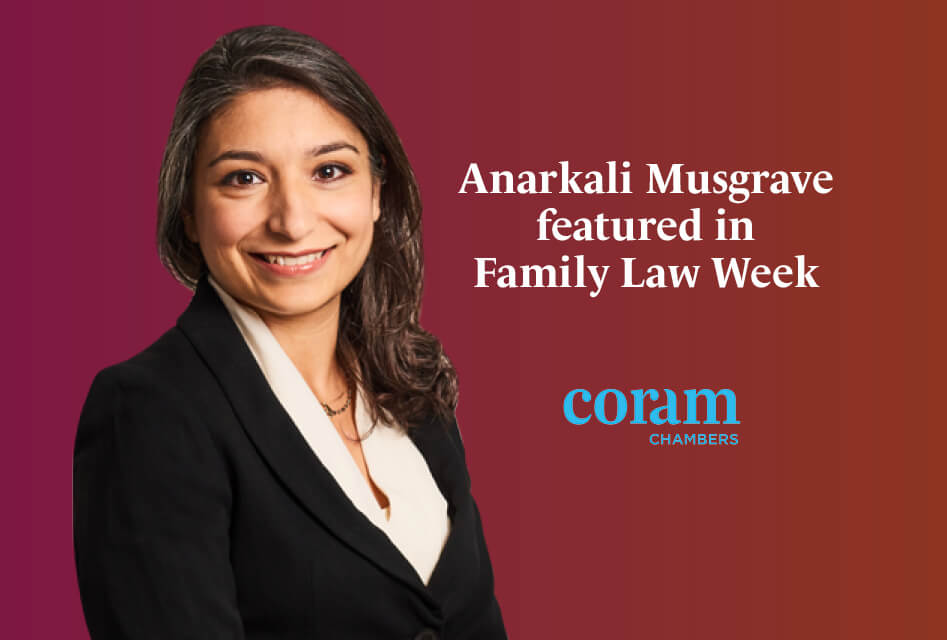Coram Chambers is pleased to announce it’s first ADR week running from 28th November- 2nd December 2022 in conjunction with Resolution’s Good Divorce Week.
The Head of Coram’s Family Finance team, Mike Horton KC sat down with retired Judge and Coram Door Tenant, HH Philip Waller CBE to discuss the benefits of private FDRs and why they are an ideal solution considering the current court backlog.
Where did the idea of a private FDR come from, and what are they?
The concept of the financial dispute resolution hearing has been with us in family cases for over 20 year. Introduced just a few years after my judicial career began, it has, to my mind, been one of the most significant innovations in the conduct of financial remedy cases in recent times, providing an opportunity for the parties to focus on the issues and probable outcomes, with the aid of judicial neutral evaluation. The private FDR appointment has developed out of that as a recognised form of dispute resolution outside the court environment, which offers greater flexibility in timing and format and allows the parties to engage an experienced evaluator (usually an experienced practitioner or retired judge) to suit their particular circumstances.
In all family cases, the court has a duty to consider whether non-court dispute resolution is appropriate and may adjourn proceedings to enable it to take place (FPR, r 3.3, 3.4). So where parties to financial remedy proceedings wish to take stock of their dispute after the initial stages and to have settlement negotiations informed by a focussed evaluation away from the court environment, the private FDR offers that opportunity.
Even before the pandemic, the listing demands on the Financial Remedy Courts were considerable. There would typically be several cases in a financial remedy list, with each FDR appointment normally allocated one hour of court time. Judges work hard to assimilate the facts and arguments in each case, but with full lists it can prove difficult to give every case the attention it requires. Parties often spend a lot of time and money in preparing for FDR, and will hope that, with a well-informed and wise indication, the case could be unlocked and a settlement reached. The FDR process is a key element in encouraging and enabling the parties to find an agreed solution and should be conducted in circumstances which give it the best possible chance of success The reality is that sometimes the court experience falls short of that expectation. The aim of the private FDR is to provide an opportunity for informed and considered negotiation with the assistance of a senior family lawyer, away from the pressures of court and in a manner more tailored to the parties’ circumstances.
Where the parties decide to have a private FDR, the process is straightforward. They will first wish to choose their ‘evaluator’ – the person assuming the function carried out by the judge at an in-court FDR. They can then decide on the time and format of their private FDR as best suits them and agree the evaluator’s fees accordingly. Once told that the parties have agreed to hold a private FDR, the court should be asked to adjourn the proceedings to enable it to take place and to vacate any FDR court hearing already listed. The court will then list the matter for mention or directions on a date after the private FDR is due to take place.
What are the advantages of a private FDR?
Freedom
The parties have freedom to choose an evaluator who is suited to their needs and their budget and in whom they can have confidence to provide an informed and realistic neutral evaluation and encourage settlement. There is a mature market and parties can select from a wide range of lawyers offering to conduct private FDRs for all types of case and all ranges of asset value. Some parties welcome the fact that an evaluator may have had prior judicial experience and experience of conducting in court FDRs and final hearings, but that is by no means essential and many experienced lawyers who have not sat as judges are busy and well-respected private FDR evaluators.
Flexibility
The private FDR offers the parties the opportunity to choose the time, venue and medium for the appointment which best meets their circumstances. The parties will not be restricted by court availability and can arrange an appointment as soon as they are ready and at a time which suits them. If, as is likely at present, the appointment takes place remotely, the parties can choose which medium or platform That means, for example, that they can choose to use Zoom, which is very effective at allowing video conferences with parties and lawyers in different locations, with private rooms available for each party to communicate with their own lawyers (but which is not currently favoured for court hearings). But the parties have the flexibility to choose whatever suits them. A party might want to have a remote private FDR, joining the evaluator and the other party on a video conference link, but join from their solicitors’ offices so that they are in the same room as their own lawyers. Likewise, flexibility of timing means that parties based overseas can join at a time which works for them.
Focus
The evaluator can be booked for as long as may be necessary to provide an effective meeting, typically for a full day. The parties can expect the evaluator’s full attention on the day of the private FDR. They can expect the evaluator to have read the bundle thoroughly, and to have a firm grasp of the case and of the parties’ respective positions. The evaluator will not have to juggle a court list and can be available as and when required.
Of course, there is a cost to this option, since the parties will have to pay the evaluator’s fees for the appointment. However, I understand that, anecdotally, the settlement success rate for private FDRs is higher than for in-court FDRs. This means that the initial costs of having a private FDR are offset by the fact that the case comes to an end sooner that it might otherwise have done, and future costs are not incurred.
In addition, where the parties have invested their time and money in a dedicated appointment, they may be more likely to invest their energy in seeking in agreed solution.
How do they work?
There is no prescribed format for the private FDR, but the basic pattern follows the in court version. In essence, the private FDR is a without prejudice meeting held for the purpose of attempting to reach a settlement or narrow issues. It will usually proceed as follows:
Preparation
a bundle (usually now electronic, as a single paginated and bookmarked pdf) will be prepared and sent to the evaluator well in advance of the private FDR meeting;
- the parties will be expected to have made without prejudice proposals in advance and make these available to the evaluator
- the parties’ advocates will prepare their notes and asset schedules and send them to the evaluator;
- the advocates will usually make contact in advance of the time of the meeting and discuss any matters arising, including any further offers or clarifications;
- the evaluator would usually have a short (video) meeting with the advocates only to confirm that everyone is ready to proceed.
The meeting
- a private FDR meeting will typically begin with everyone present and each advocate would make representations to the evaluator, expanding on their written notes. As with an in court FDR judge, the evaluator will usually ask questions to clarify points being made;
- the evaluator would then proceed to give their evaluation as to the likely outcome if the case was being decided by the court;
- the evaluator would allow the parties time to consider the evaluation and to make further proposals in an attempt to settle;
- the parties can make further offers, usually by email in a remote private FDR, and the evaluator can be called on to assist in breaking any impasse or otherwise facilitating settlement;
- if settlement is reached, the parties will in the usual way sign heads of agreement and the lawyers will draw up a detailed minute of consent order to be submitted to the court for a final order to be made.
If the parties do not reach agreement, what happens next?
If the parties do not reach agreement, the parties will need to have the case listed for directions. They should try and agree, as far as possible, the directions necessary to get the case ready for trial. If those directions are not agreed, they will need to obtain a hearing of sufficient length to have the court resolve any disputes. I understand that there are some reports of judges requiring an ‘in-court’ FDR after an unsuccessful private FDR, but that is not necessary and should be strongly resisted. Of course, the need to have the case listed for trial does not prevent the parties considering other forms of dispute resolution, including family arbitration.
What other forms of non-court based resolution are available?
It has always been possible for parties to obtain a written neutral evaluation. This is similar in function to the private FDR process, but of course is not interactive and purely done ‘on the papers’.
Since 2013, the parties have also had the option of family arbitration under the scheme created by the Institute of Family Law Arbitrators. Unlike the private FDR process, which is non-binding and without prejudice, family arbitration is out of court adjudication. It has all the same advantages of flexibility and choice for the parties, but will achieve resolution.
How do the courts view the outcome of a family arbitration?
Until recently there had only been judicial guidance as to exactly how ‘binding’ the outcome of a family arbitration was, but we now have an actual decision as to what a court should do when one party declines to enter into a consent order following an arbitral award made under the IFLA family arbitration scheme. The Court of Appeal in Haley v Haley [2020] EWCA Civ 1369 held that the court asked to make an order reflecting the terms of an IFLA arbitral award is able to decline to do so where one party objects if there are good and substantial grounds for concluding that an injustice would be done if the award were upheld. Where one party does not accept the arbitral award, no one is entitled to start again and have all factual and legal issues redetermined from scratch, but if they can establish that the award was ‘wrong’, in the sense that, if the decision had been made by a court, an appeal would properly lie to a higher court, the court would be entitled to substitute its own decision in place of the arbitral award. Although some consider this to be controversial, in that family arbitration was considered to result in a final decision incapable of challenge save in much more limited circumstances, many think that this decision will encourage more family arbitrations – parties will now know that if a decision is made by an arbitrator which is appealably wrong, it can now be corrected.
Lastly, how do you see the future of private FDRs and other forms of non-court dispute resolution?
I think there will be an increasing demand for out-of-court resolution generally. The flexibility which private FDRs and other options offer is attractive to those who would like a faster, cost-effective means of resolving their financial affairs. The potential costs involved in contested proceedings can be prohibitive – as exemplified by several reported decisions in the past year – and should act as an incentive to seek other forms of dispute resolution.
Coram’s ADR services
For more information on Coram’s Dispute Resolution services, please contact Coram’s Director of Clerking, Hudson Brewer.


